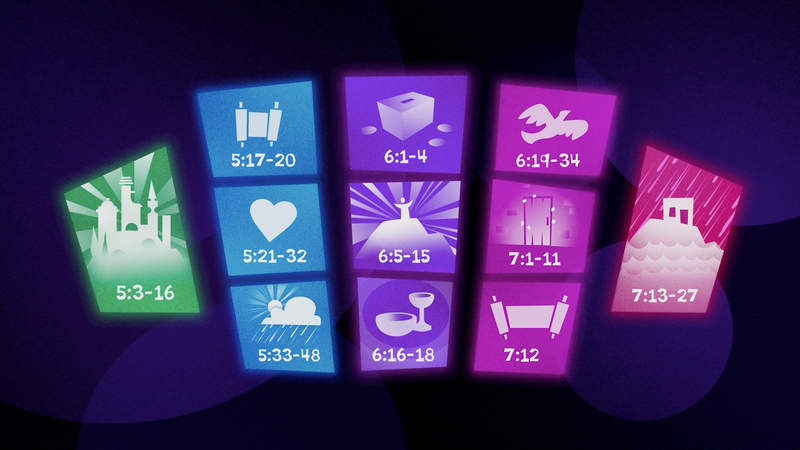Introduction to the Sermon on the Mount
About

If you’ve heard about Jesus of Nazareth, you likely know he was a famous teacher, and his most well-known words, recorded in the “Sermon on the Mount,” have shaped countless lives. Some of his teaching has become proverbial, statements such as “Love your neighbor as yourself” or “Do unto others what you would have them do to you.” The Sermon on the Mount is short, only three chapters long, but its timeless ideas and images continue to endure.
In this guide, you can learn about the big picture of Jesus’ central teaching and explore related videos, podcast episodes, and more.
Context
Key Themes
- Renewing the human vision for the “good life”
- Righteousness as right-relating with God and neighbors, including enemies
- Real life in God’s peaceful, generous kingdom
Structure
- The Sermon on the Mount can be divided into three main sections:
- Opening descriptions of the good, blessed ways of life
- The main body of the speech, which describes nature and activity of of right-relationships compelled by love
- A conclusion that invites listeners to choose how they will respond
The Literary Design of the Sermon on the Mount
The Sermon on the Mount is not a random collection of teaching snippets. These are Jesus’ core teachings, organized intentionally to help readers understand emphasis points and to aid memorization. Readers can identify a tree-part repeated structure to the sermon. It contains three major sections, and the middle section (main body) itself has three parts, and each middle part breaks into three parts, as well.

At the center of the center section, we read the famous prayer Jesus taught his followers with.
9 “Pray, then, in this way:
‘Our Father, who is in heaven, Hallowed be Your name. 10 ‘Your kingdom come. Your will be done, On earth as it is in heaven.
God’s Kingdom in the Story of the Bible
So for Jesus, what does it mean for God’s Kingdom to come to Earth? To answer, we first remember that Jesus is Jewish and grew up meditating on the Hebrew Bible, the sacred Scriptures of Israel. They told the story of God and his way of life in a heavenly kingdom along with humanity and its ways of life in its own kingdoms on Earth.
God first creates a well-ordered world where the kingdom of God and Earth were one, and he appoints humans to rule on his behalf. When humans rule with God’s wisdom and love — that is, when justice and peace prevail, and love compels all to care for one another generously — they are experiencing God’s Kingdom and God’s will being done here on Earth as it is in Heaven (Genesis 1). But that’s no easy task. Humans start building their own kingdoms, according to their own wisdom (Genesis 3; Genesis 4; Genesis 11).
God’s response is to help humanity, and he chooses one family, the people of Israel (Abraham’s family), to bring life to every other family on Earth.
12 Now the Lord said to Abram,
“Go from your country, And from your relatives And from your father’s house, To the land which I will show you; 2 And I will make you into a great nation, And I will bless you, And make your name great; And you shall be a blessing; 3 And I will bless those who bless you, And the one who curses you I will curse. And in you all the families of the earth will be blessed.” 4 So Abram went away as the Lord had spoken to him; and Lot went with him. Now Abram was seventy-five years old when he departed from Haran. 5 Abram took his wife Sarai and his nephew Lot, and all their possessions which they had accumulated, and the people which they had acquired in Haran, and they set out for the land of Canaan; so they came to the land of Canaan. 6 Abram passed through the land as far as the site of Shechem, to the oak of Moreh. Now the Canaanites were in the land at that time. 7 And the Lord appeared to Abram and said, “To your descendants I will give this land.” So he built an altar there to the Lord who had appeared to him. 8 Then he proceeded from there to the mountain on the east of Bethel, and pitched his tent with Bethel on the west and Ai on the east; and there he built an altar to the Lord and called upon the name of the Lord.
God’s wisdom for Abraham’s family is called the Torah, which in Hebrew, means “teaching” or “instruction.” Beginning with Moses on Mount Sinai, God enters into a sacred covenant with them (Exodus 19-20). God chooses this one family to be transformed by God’s wisdom so that they can represent God’s Kingdom before all the nations (Exodus 19:3-6).
Waiting for God’s Kingdom
But in Jesus’ day, God’s Kingdom is nowhere to be seen. In fact, Israel in the first century is suffering under the thumb of Roman oppressors. So why hadn’t God’s Kingdom come? Many religious leaders, like the scribes and the Pharisees, thought it wasn’t coming because Israel wasn’t being faithful enough to the Torah. Other leaders, called the Sadducees, thought it would be best if Israel found a way to cooperate with Rome, and so they became the power brokers of Jesus’ day. Some known as “the zealots” ran for the hills to become freedom fighters against Rome. And still others withdrew to the desert, waiting for God to use them to start a new Israel.
But if you were to walk around the hill country of Israel like Jesus did, you would have mostly found normal people figuring out their lives as best they could. Most were barely hanging on—lots of poor and sick people. Many had lost their land to the Roman occupiers and were struggling to pay the heavy taxes. They are largely feeling powerless and hopeless.
Jesus Announces the Kingdom’s Arrival
So Jesus went to these people, healing the sick and announcing that God’s Kingdom was arriving.
23 Jesus was going about in all of Galilee, teaching in their synagogues and proclaiming the gospel of the kingdom, and healing every disease and every sickness among the people.
24 And the news about Him spread throughout Syria; and they brought to Him all who were ill, those suffering with various diseases and severe pain, demon-possessed, people with epilepsy, and people who were paralyzed; and He healed them. 25 Large crowds followed Him from Galilee and the Decapolis, and Jerusalem, and Judea, and from beyond the Jordan.
People gathered from all over to hear his teachings. And one day, Jesus went up to a hill and said the arrival of God’s Kingdom was starting, here and now with them — the powerless and the weak. This is why the very first line of the Sermon on the Mount is:
3 “Blessed are the poor in spirit, for theirs is the kingdom of heaven.
In other words, where can you go and see God’s presence and blessing springing to life? Among the rich? Among the powerful? “No!” Jesus says. Look where people are poor, where they feel crushed and defeated. God’s Kingdom is beginning with those very people.